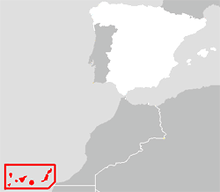Creator Omnium
Creator Omnium is bull issued by Pope Eugene IV in 1434 which excommunicates anyone who enslaves Christians of the Canary Islands.

Background
Christianity had gained many converts in the Canary Islands by the early 1430s however the ownership of the lands had been the subject of dispute between Portugal and the Kingdom of Castille. The lack of effective control had resulted in periodic raids on the islands to procure slaves. As early as the Council of Koblenz in 922, the capture of Christians as slaves by other Christians had been condemned.[1] A complaint was lodged by Fernando Calvetos, bishop of the islands, who informed the pope of pillaging carried out by a Portuguese expedition. Pope Eugene IV issued a Papal Bull, "Creator Omnium", on [2] 17 December 1434,[3] annulling previous permission granted to Portugal to conquer those islands still pagan.
Content

Creator Omnium alludes to the common humanity between converters and converted.[2] Eugene excommunicated anyone who enslaved newly converted Christians, the penalty to stand until the captive was restored to their liberty and possessions.[4] No protection was offered to those who declined to become a Christian.[5] Historian Richard Raiswell interprets this as a significant turning point because prior to this Canon Law had only sanctioned slavery in the context of a just war and un-baptized captives, but with the issuing of this bull the only protection offered was if the person became a Christian. However, Raiswell also notes that in 1442 Prince Henry of Portugal sought a papal characterization of his raids along the west coast of Africa, as a crusade against the Saracens, in order to legitimize enslaving captives.[4]
It is not clear to what extent raiders made a distinction between Christian and non-Christian. Michael Stogre holds that Nicholas intended the ban to protect non-Christians as well, in keeping with the view of Innocent IV that the flock of Christ included "pagan sheep" that he ultimately hoped to Christianize.[6]
Portuguese soldiers continued to raid the islands during 1435 and Eugene issued a further edict Sicut Dudum that prohibited wars being waged against the islands and affirming the ban on enslavement.[3]
Notes
- ↑ "Decrees on Sale of Unfree Christians", Medieval Sourcebook, Fordham University
- 1 2 Housley, Norman. Religious Warfare in Europe 1400-1536, Oxford University Press, 2002, ISBN 9780198208112
- 1 2 Richard Raiswell, p. 260
- 1 2 Raiswell, Richard. "Eugene IV, Papal bulls of", The Historical Encyclopedia of World Slavery, Junius P. Rodriguez ed., ABC-CLIO, 1997 ISBN 9780874368857
- ↑ Melton, J. Gordon. Faiths Across Time: 5,000 Years of Religious History, ABC-CLIO, 2014, ISBN 9781610690263
- ↑ Stogre, Michael. That the World May Believe: The Development of Papal Social Thought on Aboriginal Rights, Chap.2, "Alexander Vi and the bulls of Demarcation", p.64, Médiaspaul, 1992, ISBN 9782890395497
References
- Housley, Norman. Religious Warfare in Europe 1400-1536, Oxford University Press, 2002, ISBN 9780198208112
- "The Historical Encyclopedia of World slavery",Contributor Richard Raiswell, Editor Junius P. Rodriguez, ABC-CLIO, 1997, ISBN 0-87436-885-5
- "Christopher Columbus and the enslavement of the Amerindians in the Caribbean. (Columbus and the New World Order 1492-1992).", Sued-Badillo, Jalil, Monthly Review. Monthly Review Foundation, Inc. 1992. HighBeam Research. 10 August 2009